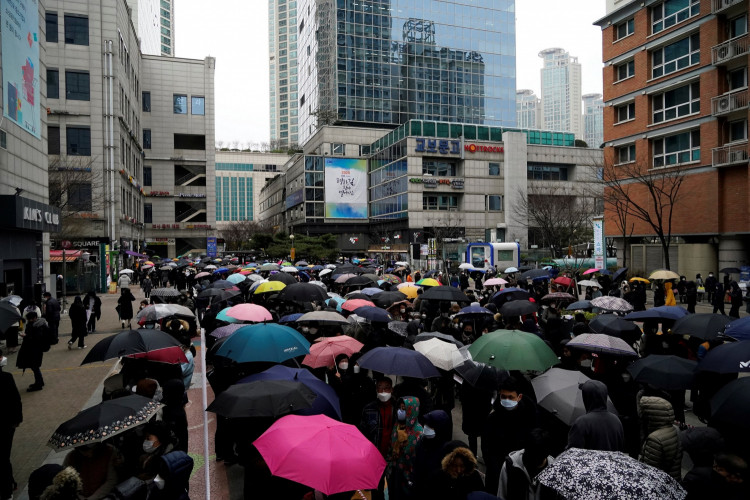The coronavirus outbreak in Asia is preparing to go all-out as South Korea and Malaysia reported new cases and Filipinos were put on quarantine.
South Korea Reports Over 250 New Cases
South Korea's Centers for Disease Prevention and Control (KCDC) reported on Thursday that it has 256 new coronavirus cases and no new deaths.
According to CNBC, the KCDC further revealed that of the new cases, a total of 182 people were from Daegu city, where the first cluster within the Shincheonji Church of Jesus was discovered earlier this month.
Shortly after the news emerged, famous K-Pop band BTS canceled a total of four concerts supposed to be held at the Seoul Olympic Stadium on April 11, 12, 18, and 19. The said concerts were expected to see up to 200,000 people in attendance.
Amid a spike in South Korean CoVID-19 infections, the country's culture minister has asked religious groups to "refrain" from holding mass gatherings in the meantime to prevent further infections in the country.
'Maximum Containment' for North Gyeongsang Province and Daegu
Earlier this week, the South Korean government declared Daegu city and North Gyeongsang province as "special care zones." The said areas have been placed under "maximum containment" but more details have yet to be revealed regarding the extent of the containment measures.
Professor of international relations at Pusan National University's Political Science and Diplomacy department Robert E Kelly wrote in a commentary for Channel News Asia that one of the problems the South Korean government will face is the country's apparent freedom.
The country is known for the freedom its citizens enjoy in many aspects, specifically in terms of religion. The Shincheonji religious group, for instance, is in the center of the country's coronavirus community-spreading incidents.
It remains to be seen whether Seoul will move to impose stricter movement limits in the midst of the Korean culture of liberty.
Malaysia Reports New Case from Japan
Malaysia's Health Ministry reported on Thursday that its 23rd coronavirus case is a woman who tested positive just days after returning from a trip to Japan.
The ministry said the 53-year-old woman is now being treated in a Kuala Lumpur hospital. Also on Thursday, two patients who tested positive were discharged after recovering from the disease.
So far, Malaysia has tested 1,569 people for potential CoVID-19 infection while 1,523 tested negative. 23 other sampled cases are waiting for their laboratory results as the government continues to urge Malaysians to keep watch of their health.
3 Filipinos Quarantined
The Philippines on Thursday quarantined three people at the New Clark City in Tarlac after showing coronavirus symptoms.
According to CNN, Health Secretary Francisco Duque III explained that the three patients were admitted at the Jose B. Lingad Hospital after developing colds and coughs. Samples from the patients have been forwarded to the Research Institute for Tropical Medicine.
From the Diamond Princess cruise ship, 440 crew members have been quarantined at the Athlete's Village in New Clark City. They were repatriated from Japan and have started their 14-day quarantine.
The quarantine process involves two medical checks daily to determine whether any of the quarantined Filipino citizens will develop any CoVID-19 symptoms. Patients who display symptoms will immediately be transported to a designated hospital for treatment.
Singapore Viewed as a Test on CoVID-19 Neutralization
Singapore, on the other hand, used to record the largest outbreak outside China. Things have changed drastically over the past few days as South Korea topped the list.
The city-state recorded 96 confirmed cases so far but there have been no deaths in Singapore as of late. Furthermore, some health experts noted that if the trend continues in the city-state, it could become a determining factor as to whether the novel virus can be either neutralized or contained effectively.
Singapore boasts of one of the highest-rated health systems around the world. It also has a small population that largely adheres to government regulations or new orders such as self-quarantine when one feels sick.
Health providers believe the Singaporean spirit of uniting during such emergencies can be one of the reasons why infection tolls have been subsiding in the city-state and no deaths have taken place so far.





